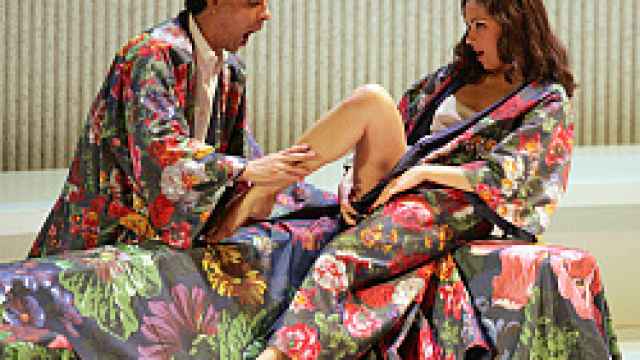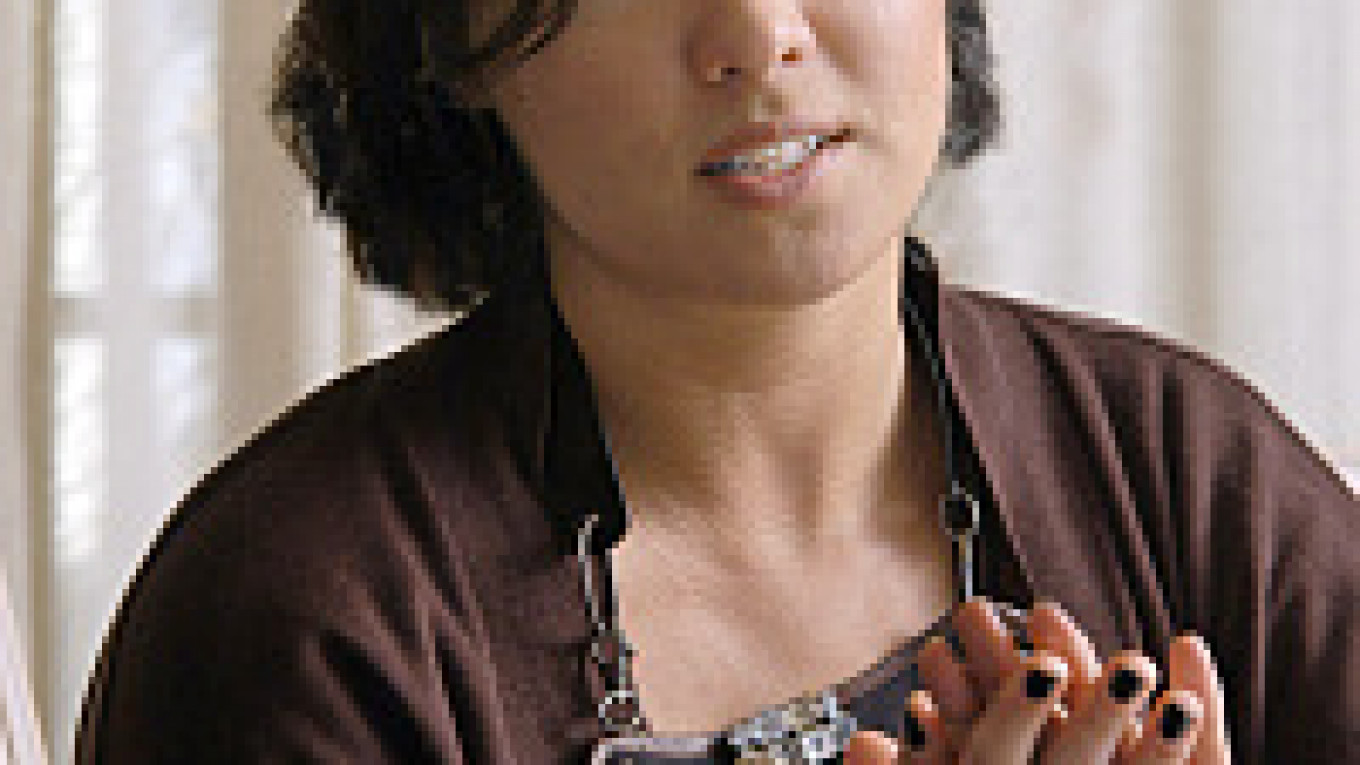"I am both upset and frustrated," she said in an interview at the Mariinsky's Backstage restaurant on a fleeting, one-day visit to the city earlier this month. "It turns out I can't afford to make my own decisions anymore."
The singer, who is popular in Austria and Germany, said her citizenship application had been considered favorably by the Austrian authorites, but that she had had second thoughts and withdrawn it.
Being branded a renegade in her home country was more than the singer could bear. "There is more to it than some reporters calling me a defector, as if we are at war; even some of my fellow Mariinsky musicians would approach me, and whisper dramatically, 'How could you do this?', 'Oh, I can't believe it' or something equally disapproving," Netrebko said.
"I am not a deserter," stressed the singer, who won the State Prize of Russia, the country's most prestigious cultural award, in 2005. "My idea was to retain Russian citizenship while getting Austrian citizenship as well. Dual citizenship doesn't exist between the two countries, but the authorities were willing to make an exception.
"I am a singer, I have an international audience, and I shouldn't be going through this humiliation, these endless applications [for visas] and waiting [for papers] with a sinking heart," she said. "I have concerts in Austria next week, and I still haven't received a new Schengen visa. I don't deserve this disgrace. The audiences want me there, all the tickets have been sold, but I still have to sit and wait for a visa."
The singer, whose engagements include regular performances at London's Royal Opera House (Covent Garden), the Vienna Opera, the Salzburg Festival, the Bavarian Opera, the San Francisco Opera, the Los Angeles Opera and the Metropolitan Opera in New York, has to carefully calculate each stay in Schengen-visa countries (Austria, Belgium, Denmark, Finland, France, Germany, Iceland, Italy, Greece, Luxembourg, the Netherlands, Norway, Portugal, Spain and Sweden). As a Russian citizen, she may not spend more than 180 days per year in these countries.
The visa regime between Russia and the EU is often strongly criticized by travelers, who find the process of getting a visa humiliating. Complaints come from both Russians traveling abroad and EU citizens planning a trip to Russia.
But don't international performers such as Netrebko have a way around the bureaucracy?
"No, we all go through this -- and [the Mariinsky's artistic director] Valery Gergiev duly submits his application to be reviewed [like everyone else] -- until people get the chance to get a second citizenship and decide to go for it," Netrebko said. "It is not a question of being disloyal to your home country. It just helps make our hectic and tense lives a little bit less stressful."
So when Netrebko, whose schedule is packed with shows across Europe, and especially in Austria, was asked by her agent to consider applying for Austrian citizenship several months ago, she felt she was ready for the move.
In normal circumstances, it takes 10 years to obtain Austrian citizenship, but Netrebko would have been naturalized within six months should she have proceeded with the application.
A number of the Mariinsky Theater's soloists have made a second home abroad. Tenor Vladimir Galuzin, for example, lives in Luxembourg.
The Russian soprano feels close to Austria for many reasons. "Vienna is the most charming place; it feels natural and some of its districts remind me of St. Petersburg," she said. "I need to be there for work quite a lot, but I fancy the city as a place to live. I was thinking of buying an apartment there one day."
 Leonhard Foeger / Reuters Netrebko, a frequent visitor to Austria, rehearses for a production of "La Traviata" with tenor Ronaldo Villazon in Salzburg last year. | |
"Neither myself nor anybody around me had expected a big success, apart from the director, who had great faith in me as Donna Anna," Netrebko remembered. "Basically, I learned my lines and score and went on stage without particularly high expectations."
But the performance won her an array of flattering reviews, a list of plum contracts with the world's major operatic companies and a welcome place at every Salzburg Festival ever since and at least until 2010.
Salzburg Festspiele, a magazine for friends and patrons of the festival, called Netrebko "the miracle of Salzburg."
"Salzburg was not prepared for this: no CD, no poster, no limousine," Festspiele wrote. "And yet she and her voice are the sensation of Salzburg."
The admiration is mutual. "I adore Salzburg; it is galvanizing to be there during the festival," Netrebko said. "I am thrilled to be there. Every day, the most distinguished musicians perform in front of the snobbiest, most sophisticated audiences, and you can just see all the snobbery melting down -- or the opposite, manifesting itself in a revolt -- sometimes both during the same show!"
Netrebko enjoys Salzburg's atmosphere, with "boos" and "bravos" overlapping in controversial productions.
The soprano, who is one of the rare opera singers endowed with not only a stunning voice -- pure in tone, rich in color and velvety in timbre -- but also with charismatic artistic talent, admits she is excited by the effects that her performances have on people.
"Of course, it is exciting to feel power over the audience," she said.
Netrebko came to St. Petersburg from her hometown of Krasnodar at the age of 16 to enter the Rimsky-Korsakov Music College, and then the Conservatory, dreaming of becoming an operetta singer. A few visits to the Mariinsky convinced her that she was moving in the wrong direction. Netrebko joined the world-famous company at age 22, simultaneously dropping out of the Conservatory in her fourth year there.
There was little glamour in Anna Netrebko's first years on the banks of the Neva River. She lived in a notorious dormitory belonging to the St. Petersburg Conservatory on Ulitsa Doblesti and worked as a floor cleaner at the Mariinsky Theater, where she dreamed of performing.
In 2004, Salzburg's Festspiele placed Netrebko second in a list of divas with prima donna criteria such as charm, style, manners, social habits, appearance and dress, after Angela Gheorghiu. Renee Fleming, Cecilia Bartoli, Karita Mattila and Deborah Voigt were placed lower down in the ranking.
The glamour rating may have been flattering, but with public appetite for details about her life both onstage and off becoming voracious, Netrebko feels she needs to assert her independence.
"It is not only that everyone discusses what I do, people start making their own -- questionable and speculative -- conclusions, and spread them around," she said. "So for the moment, the only option left is to freeze the citizenship application, unless I want to live with the reputation of a defector. And I don't. So here I am, waiting to get my next Schengen visa approved."
A Message from The Moscow Times:
Dear readers,
We are facing unprecedented challenges. Russia's Prosecutor General's Office has designated The Moscow Times as an "undesirable" organization, criminalizing our work and putting our staff at risk of prosecution. This follows our earlier unjust labeling as a "foreign agent."
These actions are direct attempts to silence independent journalism in Russia. The authorities claim our work "discredits the decisions of the Russian leadership." We see things differently: we strive to provide accurate, unbiased reporting on Russia.
We, the journalists of The Moscow Times, refuse to be silenced. But to continue our work, we need your help.
Your support, no matter how small, makes a world of difference. If you can, please support us monthly starting from just $2. It's quick to set up, and every contribution makes a significant impact.
By supporting The Moscow Times, you're defending open, independent journalism in the face of repression. Thank you for standing with us.
Remind me later.


